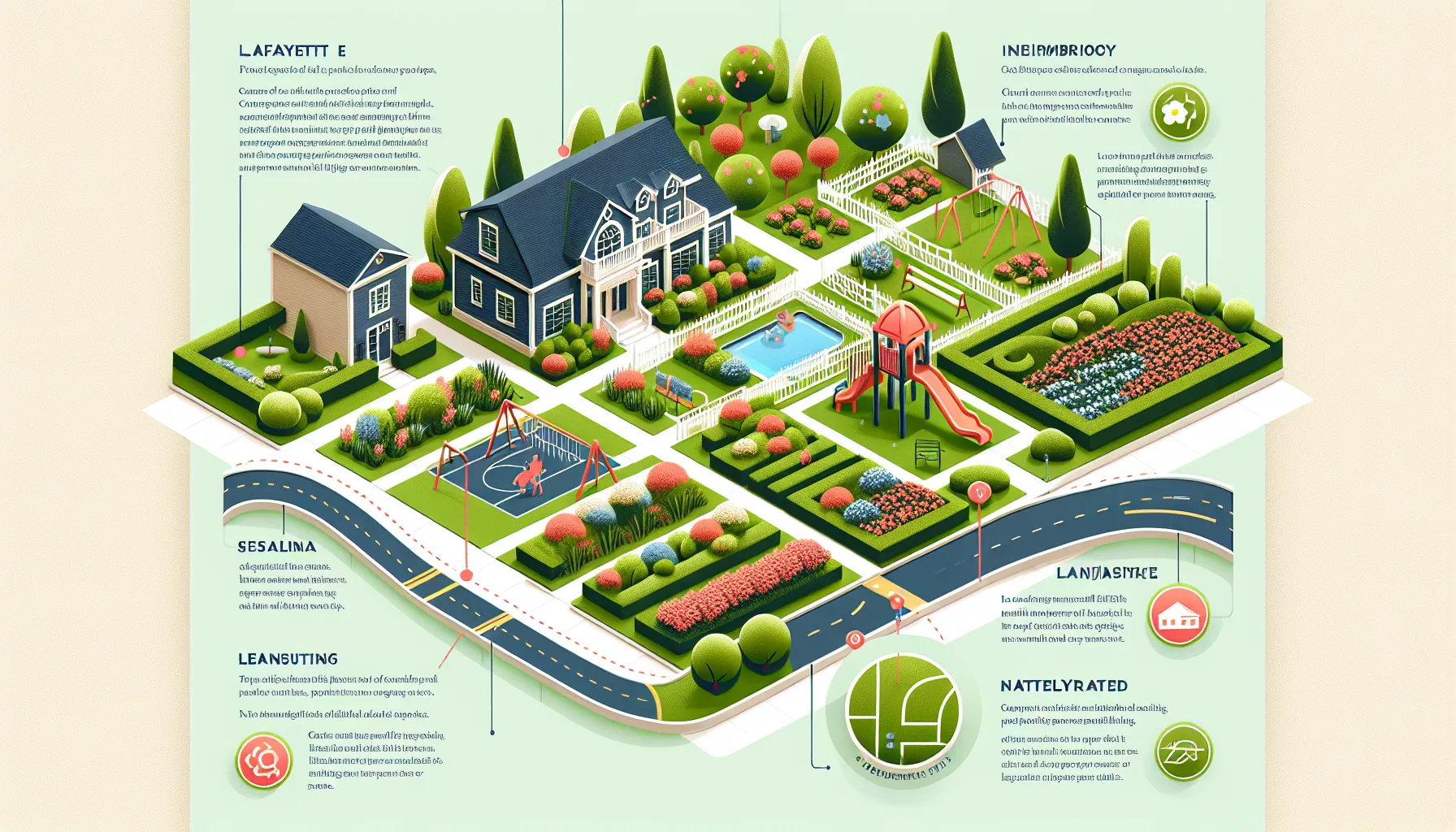Key Takeaways
- HOA dues in Lafayette fund essential services like landscaping, maintenance, amenities, security, and insurance to help maintain property values and community standards.
- The amount you pay varies based on your community’s size, the quality and number of amenities, and allocation to reserve funds for future repairs.
- Dues can fluctuate due to changes in utility costs, insurance premiums, new amenities, or unexpected repairs that require special assessments.
- Reviewing financial reports and annual budgets from your HOA provides transparency on how your payments are spent and supports better budgeting.
- Staying actively involved in HOA meetings and decision-making helps ensure you understand and have a voice in how dues are managed in your community.
Understanding HOA dues in Lafayette can feel overwhelming, especially when you’re trying to figure out exactly what you’re paying for each month. I know how important it is to see where your money goes and how it supports your community’s needs. From maintenance fees to special assessments, every dollar has a purpose.
Have you ever wondered why HOA dues vary so much or what services are actually included? You’re not alone. Many homeowners want clear answers about these monthly expenses. Let’s break down the typical costs and what they mean for your property and peace of mind.
What Are HOA Dues in Lafayette?
HOA dues in Lafayette represent a regular payment homeowners make to support the upkeep and management of shared spaces within their community. These payments help fund landscaping, maintenance of amenities like pools and clubhouses, and repair of roads or exterior features. I often find that these fees cover general services, so residents don’t have to handle these tasks themselves.
Typical costs vary, with dues often depending on the size of the community, its amenities, and the types of services provided. For example, communities with gated entry, round-the-clock security, or fitness centers usually have higher dues than those without these features. Some HOAs also collect reserve funds to handle larger future expenses, like replacing a roof or repaving driveways. Does your current association explain how your money is spent?
I notice some homeowners wonder why HOA dues sometimes change from year to year. Dues may increase if utilities rise, property insurance premiums go up, or new amenities are added. Special assessments sometimes happen, especially if unexpected repairs or large projects come up that the reserve fund can’t cover. Have you ever received notice about a fee increase or a special charge for a repair?
Being clear on what HOA dues include can make budgeting simpler and help you know what to expect each month. If you’re curious about the breakdown of your payments, asking your HOA board for a budget summary or audited financial statements may help. Are you getting all the services you expect from your association dues?
Common Expenses Covered by HOA Dues

HOA dues in Lafayette usually cover more than just property upkeep. These regular payments support shared services that help maintain comfort and property values across the neighborhood. Curious about where your monthly dues go and which items you benefit from daily?
Landscaping and Grounds Maintenance
Landscaping and grounds maintenance take a significant portion of HOA dues. Regular expenses include mowing lawns, trimming hedges, and planting seasonal flowers in entryways and common parks. Services often extend to irrigation system upkeep, mulch replacement, and routine tree care. Well-kept public spaces also protect curb appeal and support a safe, inviting environment for all residents. How often do you notice landscaping crews working in your community?
Community Amenities and Facilities
Community amenities and facilities receive ongoing support through HOA dues. Your payments often fund the operation and periodic repairs for spaces like swimming pools, clubhouses, playgrounds, walking trails, and tennis courts—depending on community offerings. Budget allocations typically cover cleaning services, equipment maintenance, and supplies, helping everyone enjoy well-maintained amenities year-round. Which facility in your neighborhood adds the most value to your lifestyle?
Security and Insurance
Security and insurance costs form a stable part of HOA dues. Security expenses might pay for gated entrance systems, security patrols, surveillance cameras, or controlled access points. Insurance premiums usually protect shared buildings, liability related to communal areas, and sometimes disaster recovery aid. These costs work together to manage risks and provide peace of mind for every homeowner. Are there security features in your development that make you feel more comfortable?
Administrative Costs
Administrative expenses help cover the behind-the-scenes work that keeps your HOA running smoothly. Portions of dues pay for bookkeeping, record keeping, mailings, meeting organization, and legal support. Administrative costs may also include professional management fees, such as those for property managers, who coordinate repairs and resident communication. Thoughtful management of these funds can keep community issues resolved quickly and prevent bigger problems from developing. Have you noticed positive changes after HOA board meetings or updates from managers?
Factors Affecting HOA Dues in Lafayette

Several factors shape how HOA dues are set in Lafayette. Understanding these influences helps me plan and budget with confidence. Have you noticed changes in your own dues and wondered about the reasons behind them?
Community Size and Amenities
Community size and amenities directly impact monthly dues. Larger communities with more homes can spread costs across more residents, which sometimes lowers the fee per household. However, properties that offer amenities like pools, parks, gyms, or gated entry require more maintenance and security. For example, maintaining a neighborhood pool or sustaining fitness equipment adds to routine expenses. Have you compared amenities in neighborhoods you’ve considered moving into?
Reserve Fund Contributions
HOAs collect contributions for a reserve fund to cover future major repairs or upgrades. This fund acts like a savings account for the community. Older developments or those with lots of shared infrastructure may require larger contributions to stay prepared for big projects, like roof replacements or pavement repairs. Healthy reserve funding prevents sharp, unexpected increases in dues and keeps communities financially stable. Are you familiar with how your HOA builds its reserves?
Unexpected Repairs or Assessments
Unexpected repairs or special community needs can lead to sudden fee changes. When expensive projects or emergencies arise—think water main breaks or severe storm damage—HOAs may collect one-time special assessments. These costs vary widely depending on the age and upkeep of common areas and buildings. It helps to ask about the association’s history of special assessments before buying a home. Have you experienced special assessments in your HOA community?
How to Review Your HOA Dues Breakdown

Understanding where your HOA dues go can make budgeting easier and help you feel more confident about your investment in your Lafayette community. Have you ever wondered how your monthly payments actually get used? This section will help you find clear answers about your HOA’s financial health and spending.
Requesting Financial Reports
Requesting financial reports gives me a clear snapshot of the HOA’s income and expenses. Most associations must provide these documents to homeowners if asked. Monthly financial statements, balance sheets, and profit-and-loss summaries often break down exactly where each dollar is spent. Am I comfortable asking my board for these details? How frequently do I review these reports, and do I understand what I’m looking at? Getting regular access to financial reports helps me spot trends, track spending on amenities or repairs, and identify areas where costs may be rising. When I see line items for landscaping, insurance, and reserve funding, I get a more dependable picture of why my payments look the way they do.
Understanding the Annual Budget
HOA budgets lay out projected expenses for the upcoming year. Reviewing this budget helps me understand how dues are calculated and allocated. Common expense areas include landscaping, maintenance, security, insurance, administration, and contributions to reserve funds for future repairs or improvements. Does the budget explain any anticipated increases or new projects? Are there categories that look larger this year compared to last? Asking these questions lets me see where changes are happening and how they might affect my monthly payments. When I review the annual budget and any meeting notes where it’s discussed, I feel more connected to decision-making in my community.
Tips for Managing HOA Dues in Lafayette

Open communication with your HOA board helps you stay informed. I find that attending meetings gives clearer insight into budget decisions and upcoming changes. Are you receiving regular updates about expenses and projects in your community?
Requesting a copy of the annual budget or recent financial statements lets you see exactly where your payments go. Reviewing these documents monthly builds trust and makes surprises less likely. Which expenses or services listed in the budget seem most important to you?
Setting aside funds for unexpected increases in dues or special assessments reduces stress. I always keep a small emergency fund for occasions when unexpected repairs or upgrades arise. How prepared do you feel for sudden dues changes or special assessments?
Comparing dues with nearby communities provides helpful perspective on what’s typical in Lafayette. I look for communities with similar amenities and sizes for the most accurate comparisons. Do you think your current amenities reflect the amount you pay each month?
Participating in HOA elections or committees helps influence decisions about spending and services. Even volunteering for one event or committee makes a difference. How involved do you feel in your community’s decision-making?
Staying organized by tracking payment deadlines and keeping all HOA correspondence in one place saves time. Late payments sometimes lead to extra fees or loss of amenities. What strategies work best for you to keep up with these deadlines?
Setting reminders for upcoming meetings, annual inspections, or fee adjustments keeps you on track. These small organizational steps make managing HOA responsibilities less overwhelming. How do you keep track of important HOA dates and communications at home?
Conclusion
Navigating HOA dues in Lafayette doesn’t have to be overwhelming. When I take the time to review my association’s financial documents and stay engaged with the board I feel more confident about where my money goes each month.
By staying proactive and informed I can make smarter decisions about my home and contribute to a thriving community. Understanding the details behind my dues helps me budget more effectively and ensures I get the most value from my investment.
Frequently Asked Questions
What do HOA dues in Lafayette typically cover?
HOA dues in Lafayette usually cover the maintenance of shared spaces, landscaping, community amenities (like pools and playgrounds), insurance, security, and administrative expenses. These payments help ensure the neighborhood stays well-maintained and residents can enjoy commonly shared facilities.
Why do HOA dues vary between communities?
HOA dues vary due to differences in community size, the variety and quality of amenities (such as gated entries or fitness centers), and the specific services offered. Communities with more extensive or upscale amenities typically have higher monthly dues to cover added maintenance costs.
Can HOA dues change from year to year?
Yes, HOA dues can increase or decrease annually. Changes often reflect rising utility or maintenance costs, the addition of new amenities, or the need to build reserve funds for future repairs. Homeowners should review annual budgets to stay informed about any changes.
What are special assessments, and when are they charged?
Special assessments are one-time fees that HOAs charge to cover unexpected or major repairs that aren’t included in the regular budget, such as emergency roof replacements or major facility upgrades. They are usually required when the reserve fund is insufficient for these expenses.
How can I find out what my HOA dues include?
You can request a breakdown from your HOA board or management company. Annual budgets and financial statements detail how dues are allocated. Attending HOA meetings is also a good way to understand what services and amenities your dues fund.
What is a reserve fund and why is it important?
A reserve fund is money set aside by the HOA for future major repairs or unexpected expenses, like roof replacements or pool renovations. Having a healthy reserve fund helps prevent sudden increases in dues or large special assessments.
How can I manage my HOA dues effectively?
Stay informed by attending HOA meetings, reviewing financial reports, and maintaining open communication with board members. Set aside funds for potential increases and compare your dues with similar communities. Participating in HOA elections or committees can also help you influence spending decisions.
What should I know about my HOA’s history with special assessments?
It’s wise to ask for your HOA’s history of special assessments before purchasing a home. Frequent or large assessments could indicate poor budgeting or insufficient reserve funds, which may affect your financial planning as a homeowner.
Are landscaping and ground maintenance always included in HOA dues?
Most HOA dues in Lafayette include landscaping and ground maintenance, as keeping common areas attractive and safe is a priority. However, it’s important to confirm the specific services included with your HOA, as coverage may vary between communities.
How do I avoid late fees on my HOA dues?
Pay your dues on time by keeping track of deadlines and setting reminders. Some HOAs offer automatic payment options, which can help you avoid late fees and maintain a good standing within your community.
